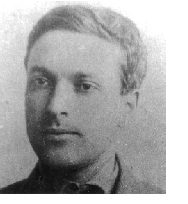Lev Vygotsky (1896–1934) was a Russian psychologist whose pioneering work focused on child development, and the connections between language development, social learning and cognition. Vygotsky analyses the way in which language acquisition shapes a child’s growing cognitive capabilities.

The second major phase on the way to concept formation comprises many variations of what we shall call thinking in complexes … In a complex, the bonds between its components are concrete and factual rather than abstract and logical … [S]pontaneous complex formations make up the entire first chapter of the developmental history of children’s words … [A] child’s use of ‘quah’ to designate first a duck swimming on the pond, then any liquid, including the milk in his bottle; when he happens to see a coin with an eagle on it, the coin is also called a ‘quah’, and then any round, coinlike object. This is typical of a chain complex [one amongst a number of varieties of thinking in complexes]—each new object included has some attribute in common with another element, but the attributes undergo endless changes … [A]t the complex stage, word meanings as perceived by the child refer to the same objects that the adult has in mind, which ensures understanding between child and adult, but that child thinks the same thing in a different way, by means of different mental operations … Complex thinking begins the unification of scattered impressions; by organising discrete elements into groups, it creates the basis for later generalizations.
But the advanced concept presupposes more than unification. To form such a concept it is also necessary to abstract, to single out elements, and to view the abstracted elements apart from the totality of the concrete experience in which they are embedded … In the actual development of the child’s thinking, the above-mentioned functions—generalization and abstraction—are closely intertwined. The greatest difficulty of all is the application of the concept, finally grasped and formulated at the abstract level, to new concrete situations that must be viewed in these abstract terms …
As we know from investigations of the process of concept formation, a concept is more than the sum of certain associative bonds formed by memory, more than a mere mental habit; it is a complex and genuine act of thought that cannot be taught by drilling but can be accomplished only when the child’s mental development itself has reached the requisite level … The development of concepts, or word meanings, presupposes the development of many intellectual functions: deliberate attention, logical memory, abstraction, the ability to compare and to differentiate. These complex psychological processes cannot be mastered through the initial learning alone …
[It] is precisely during early school age that the higher intellectual functions, whose main features are reflective awareness and deliberate control, come to the fore in the developmental process … Attention, previously involuntary, becomes voluntary and increasingly dependent on the child’s own thinking; mechanical memory changes to logical memory guided by meaning, and can now be deliberately used by the child. One might say that both attention and memory become ‘logical’ and voluntary, since control of a function is the counterpart of one’s consciousness of it …
Practical experience … shows that direct teaching of concepts is impossible and fruitless. A teacher who tries to do this usually accomplishes nothing but empty verbalism, a parrot-like repetition of words by the child, simulating a knowledge of the corresponding concepts but actually covering up a vacuum.
Vygotsky, Lev. 1934 (1986). Thought and Language. Cambridge, MA: MIT Press.. pp.110–111, 112–113, 127, 126, 135, 136, 142, 149–150, 171, 173, 166–167, 150. || Amazon || WorldCat
